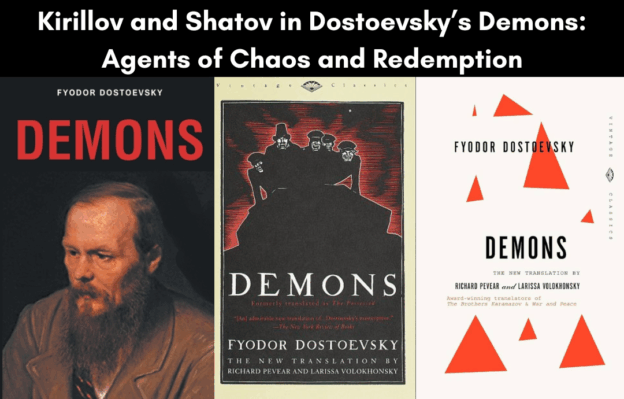This article explores the characters Kirillov and Shatov in Fyodor Dostoevsky’s novel Demons through the lens of Voltaire’s four states of belief regarding God. Kirillov, an existential nihilist, believes in asserting his ultimate freedom through suicide, reflecting the state of denying God’s existence and disbelief. Shatov, a former revolutionary turned conservative, embodies the search for spiritual and national identity, fitting the state of believing in God’s existence. Their interactions with other characters, particularly Stavrogin and Verkhovensky, highlight the novel’s critique of political extremism and the profound impact of personal beliefs on individual destinies. Through these contrasting characters, the article delves into Dostoevsky’s exploration of existential themes and the human condition.
Introduction
Fyodor Dostoevsky’s novel Demons (also known as The Devils or The Possessed) is a profound exploration of political and social turmoil in 19th-century Russia. Among the myriad of complex characters, Kirillov and Shatov stand out for their contrasting philosophies and significant roles in the narrative. This article delves into their characters, examining their ideologies, their interactions with other characters, and their ultimate fates in the story.
This article was inspired by conversations with my son, Bill, during his time at the University of Birmingham, on his degree course in English Literature.
Kirillov: The Philosophical Extremist
Kirillov, an engineer by profession, is a character whose philosophical musings and ultimate decisions embody Dostoevsky’s exploration of existential and nihilistic themes. Kirillov is obsessed with the idea of asserting his absolute freedom through an act of suicide, which he believes will make him a god. This radical idea is rooted in his rejection of conventional religious and moral beliefs, reflecting the nihilistic currents that Dostoevsky sought to critique.
- Ideology and Motivation: Kirillov’s philosophy is heavily influenced by existential nihilism. He believes that by committing suicide, he can transcend the constraints of human existence and assert his ultimate freedom. This idea is articulated in his conversations with other characters, particularly with Pyotr Verkhovensky, who manipulates Kirillov’s beliefs for his revolutionary aims.
- Role in the Narrative: Kirillov’s character serves as a foil to other ideological stances in the novel. His planned suicide is manipulated by Verkhovensky to serve as a political statement, demonstrating how personal beliefs can be co-opted by larger, destructive movements. Kirillov’s tragic end underscores the novel’s critique of radical ideologies and the human cost of such extremism.
Shatov: The Spiritual Seeker
In stark contrast to Kirillov, Shatov represents a search for spiritual and nationalistic meaning. A former revolutionary turned conservative, Shatov’s character arc reflects Dostoevsky’s own evolving thoughts on religion, politics, and identity in Russia.
- Ideology and Motivation: Shatov’s shift from revolutionary fervour to a quest for spiritual and national identity embodies Dostoevsky’s exploration of the Russian soul. He believes in the potential for a Christian revival and the importance of Russian nationalism as a moral and spiritual guide. His conversations with other characters, particularly with Stavrogin, reveal his deep internal conflict and his desperate need for redemption.
- Role in the Narrative: Shatov’s murder is one of the novel’s climactic events, symbolizing the destructive consequences of political extremism and ideological manipulation. His death, orchestrated by the revolutionary group he once associated with, underscores the novel’s tragic vision of ideological fanaticism and the human suffering it engenders.
Interactions and Contrasts
Kirillov and Shatov’s interactions with other characters and with each other highlight the novel’s thematic concerns:
- With Stavrogin: Both characters are deeply influenced by Stavrogin, whose enigmatic presence and moral ambiguity serve as catalysts for their actions. Stavrogin’s interactions with Shatov reveal his manipulative tendencies and his impact on Shatov’s spiritual crisis. Similarly, Kirillov’s philosophical dialogues with Stavrogin expose the underlying nihilism that Stavrogin embodies.
- With Verkhovensky: Verkhovensky’s manipulation of both Kirillov and Shatov for his revolutionary agenda illustrates the novel’s critique of political radicalism. Verkhovensky exploits Kirillov’s existential despair and Shatov’s search for meaning, leading to their tragic ends and highlighting the destructive power of ideological extremism.
Comparative Framework: Voltaire’s Four States
Voltaire’s framework of the four states, God exists, God doesn’t exist, you believe in God, you don’t believe in God, provides a useful lens through which to examine the characters of Kirillov and Shatov and their respective philosophical journeys:
- God Exists, You Believe in God:
- Shatov: Initially a revolutionary, Shatov’s journey leads him to embrace a belief in God and the Russian Orthodox faith. He represents the state where belief in God aligns with an existential quest for meaning and national identity. Shatov’s faith is deeply connected to his ideas of Russian exceptionalism and spiritual revival.
- God Exists, You Don’t Believe in God:
- Stavrogin: While not directly the focus of this article, Stavrogin’s moral ambiguity and existential despair could be seen as fitting this state. He is a character who struggles with belief and is a source of both fascination and turmoil for Kirillov and Shatov.
- God Doesn’t Exist, You Believe in God:
- No Direct Fit: This state is less directly represented in Demons, as the novel focuses more on the existential crises stemming from disbelief and the search for meaning rather than belief in a non-existent deity.
- God Doesn’t Exist, You Don’t Believe in God:
- Kirillov: Kirillov’s radical nihilism and his ultimate act of suicide fit this state. He denies the existence of God and believes that through his own death, he can assert absolute freedom and self-deification. His philosophy is rooted in the conviction that human beings can transcend moral and religious constraints through sheer will.
Conclusion
In Demons, Dostoevsky uses Kirillov and Shatov to explore deep philosophical and theological questions, which can be further illuminated by Voltaire’s four states. Kirillov’s nihilistic extremism and Shatov’s spiritual seeking embody the novel’s central tensions between belief and unbelief, freedom and constraint, chaos and redemption. Through their tragic stories, Dostoevsky critiques the ideologies of his time and offers a timeless reflection on the human condition, resonating with Voltaire’s exploration of belief and the existence of God.
